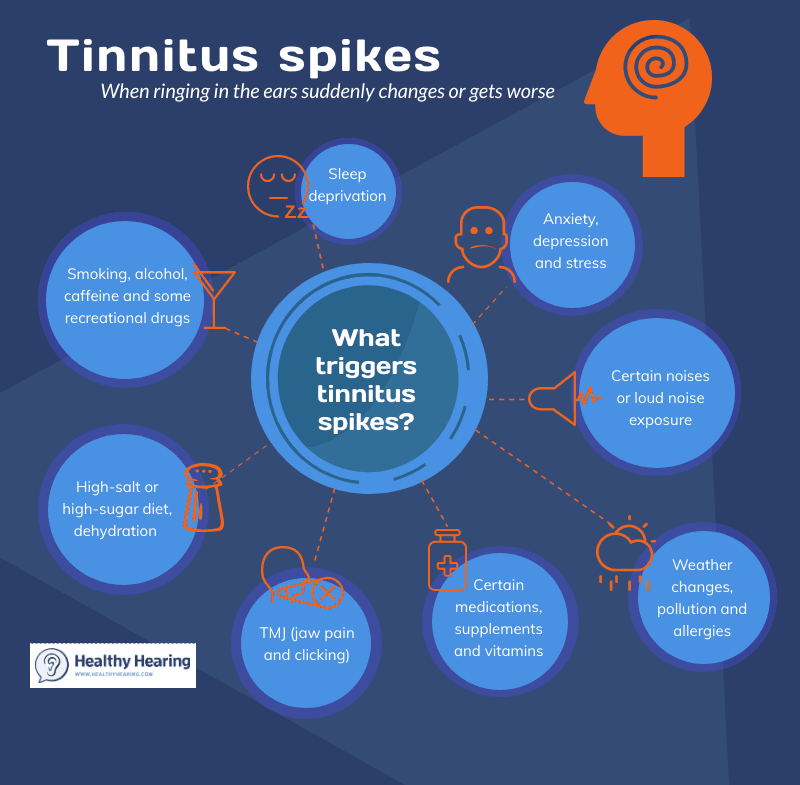|
www.HealthyHearing.com |
When it comes to tinnitus habituation, setbacks are normal'The most important thing you need to understand is that habituation is not a linear journey'
Contributed by Glenn Schweitzer Tinnitus is a solvable problem. If you’re suffering right now, it may be hard to believe, but it’s true. No matter how loud it feels or how it began, complete and lasting relief is always possible through a process called habituation. 
But the journey isn’t easy, and the road to relief is never linear, where each day feels a little bit better than the day before. Instead, it feels like taking three steps forward, two steps back, over and over again. This makes it very difficult to see progress and can lead to a lot of frustration, self-doubt, and despair. The truth, however, is that tinnitus spikes and setbacks are not failures, and difficult days are not a sign you’re moving backward. They are simply an unavoidable part of the habituation process – temporary obstacles that every tinnitus patient will encounter on the road to relief. In this column, we’ll explore the non-linear nature of habituation, why setbacks are an unavoidable part of the process, and how to maintain hope and perspective along the way. You will learn how to accurately track your progress, overcome the psychological challenges of difficult days, and avoid unnecessary suffering along the way. By the end, you’ll feel empowered to handle the many ups and downs of habituation with confidence and resilience, knowing that relief is not only possible, it’s closer than you realize.
What is habituation and how can it help with tinnitus?Habituation is the mental process by which we are able to tune out and ignore sensory perceptions that are unnecessary to our survival in our day-to-day life. It’s something we do automatically, unconsciously, all the time. Think of all the things you are not paying attention to right now as you read these words, such as the feeling of your clothing against your skin and all of the sensations of sitting (or standing). At every moment, there are countless sensations that you are simply not paying attention to, and you are not consciously choosing to ignore any of them. Your brain is filtering all of these perceptions out of your awareness automatically as you concentrate on reading. Fortunately, your brain is also capable of doing this with the sound of tinnitus. The only problem is that when tinnitus is perceived as bothersome, your nervous system will react as if you are in danger with a fight or flight stress response, and it’s impossible to ignore a sound or sensation that implies danger. Over time, this stress response intensifies, and you can quickly find yourself in a vicious cycle of fight or flight that never ends, because the tinnitus doesn’t magically go away. Tinnitus habituation is the process of retraining your brain and nervous system to stop perceiving and reacting to the sound as if it were threatening or dangerous, so your brain can automatically filter the sound of your tinnitus out of your awareness, like it does with other meaningless noise. 2 steps forward, 1 step backAfter 8 years of working 1-on-1 with more than 1,000 tinnitus patients, I truly believe that every tinnitus patient is capable of habituation, no matter how loud or bothersome their tinnitus may be. But habituation doesn’t happen all at once. It’s a difficult process that unfolds slowly over weeks and months, and you are going to face many challenges along the way. The most important thing you need to understand is that habituation is not a linear journey. It always feels like taking 2 steps forward, 1 step back, over and over again. And at times, it can feel like taking 3, or 4, or 10 steps back. Your hard work is not undoneWhat makes this even more challenging is that setbacks often occur after periods of noticeable improvement, when it feels like you’ve finally turned a corner, only to have a difficult spike bring those feelings crashing down. This can be incredibly discouraging, but it’s just a normal part of the process, and what every successful habituation journey looks like along the way. When every day is difficult, there is not much of a difference between a bad and a worse day. But when you start to have better days, the hard days feel so much worse by comparison. It can feel like all your hard work has been undone, but this isn’t true. The progress you’ve made is still there, waiting for you on the other side of the difficult moment. It’s always best to focus on the upward trend over time. Every step forward counts, even if it’s followed by a stumble. Spikes and setbacks are part of the process
It's important to understand that every tinnitus suffer who ever achieved habituation and found lasting relief experienced countless spikes and setbacks along the way. A spike is not just a moment where your tinnitus gets louder or changes in some way. I define spikes more broadly as any time your suffering increases for any reason. Spikes can happen for a variety of reasons, such as stress, lack of sleep, illness, or exposure to loud sounds. Sometimes, they seem to happen randomly, catching you off guard. But you haven’t gone backwards at all in these moments. Your progress is just on hold, and the strategy needs to temporarily shift from making progress to reducing distress. You may not be able to calm the tinnitus, but you can calm yourself and the tinnitus will eventually follow. When experiencing spikes, focus on the following three primary coping strategies, combining tools when possible:
Even if your coping efforts don’t eliminate your distress entirely, reducing it to a more manageable level will make a significant difference. During these moments, it’s important to remember that spikes always pass. You have never had a difficult moment that didn’t end eventually. Spikes are temporary, and you will pick back up with your progress where you left off as soon as the spike subsides. Do not declare victory — or defeatAs you work to habituate, spikes are inevitable, but so too are moments or periods where you suddenly feel significantly improved. These peak experiences are like positive spikes, and they can feel amazing, almost like you leapfrogged ahead to the finish line. But much like spikes, most people come to the wrong conclusions when these incredible moments occur. And the peak experiences can become a kind of psychological trap as well.
Always try your best not to declare victory on a great day, or defeat during spikes, as both will set you up for massive disappointment. Your true progress lies somewhere between the highs and the lows and can only be measured over time. If you’re having a great day, enjoy it as much as you can, but don’t declare victory as you will be setting yourself up for a major emotional crash when you inevitably return to the middle. Similarly, don’t declare defeat during setbacks, as spikes are an unavoidable part of the habituation process and always end eventually. Plus, if your worst day now is better than your worst day before, that is a clear sign of progress in and of itself. And these two points alone on the graph still form an upward sloping line that eventually leads to success. Celebrate your good days but try to view them as milestones rather than finish lines. On bad days, remind yourself that setbacks are temporary and that your progress exists beyond the highs and lows of individual moments. By focusing on long-term trends rather than day-to-day fluctuations, you can maintain a much more positive emotional state throughout the journey. How to accurately measure progressGiven how volatile and confusing the day-to-day experience of tinnitus can be, many people struggle to accurately measure and track their progress. Because of the 2 steps forward, 1 step back nature of the process, habituation cannot be measured by looking at a single day or moment, or by changes in tinnitus volume. It’s possible to have a day where your tinnitus is loud, but you don’t notice or hear it at all, or a day where it’s quieter but driving you crazy, and everything in-between. The best way to accurately measure progress is by looking at specific quality of life metrics and how they are trending over time. Tracking these changes can help you see the bigger picture, especially when the daily fluctuations make you feel like you’ve taken steps backward. Questions to ask yourselfTake a step back and look at how things have been going over days, weeks, and months, and ask yourself the following questions:
These quality-of-life indicators provide a clear and actionable way to measure progress. Day to day, these metrics will vary wildly. But as long as you notice an upward trend over time, you are making progress and on the right track. Commit to a planThere are many effective strategies for achieving habituation. At Rewiring Tinnitus, I teach a multidisciplinary strategy that includes meditation, relaxation techniques, sound therapy, coping techniques, and more. But there are many other options, such as cognitive behavioral therapy, acceptance and commitment therapy, tinnitus retraining therapy, and tinnitus activities treatment, even apps, just to name a few. The key is to choose a plan that resonates with you and to commit to it fully. Second guessing yourself or frequently changing your approach will make it much more difficult to make progress. Ignore the negative patient storiesOnce you have chosen a plan, it is also extremely important to avoid the temptation to endlessly research tinnitus online. It’s completely normal to want reassurance, but the unfortunate reality is that most people who overcome tinnitus just go back to their lives and don’t write about it online. (Tinnitus Habituation Success Stories can be found here.) Instead, what you tend to find are all the other people who are still suffering with tinnitus and scared just like you are. Anytime you read something online that makes you feel scared, or worse in any way, you are reinforcing the fears and negative beliefs that prevent habituation from happening naturally. The easiest way to avoid this, is to stop researching tinnitus online altogether, stick to one approach, and give it time to work. Habituation takes patience and consistency, but it’s always worth the effort! Final thoughtsHabituation is always possible, even when the journey feels overwhelming, and relief doesn’t require a cure. But it does require a commitment to the process and the patience to see it through. By focusing on progress over time, embracing the ups and downs, and using the right tools and strategies, you can find the lasting relief you deserve! Glenn Schweitzer
|
Featured clinics near me
Earzlink Hearing Care - Reynoldsburg
7668 Slate Ridge Blvd
Reynoldsburg, OH 43068

Find a clinic
We have more hearing clinic reviews than any other site!



 Glenn Schweitzer is an entrepreneur, blogger, and the author of Rewiring Tinnitus and Mind over Meniere’s. He is passionate about helping others who suffer from tinnitus and vestibular disorders and volunteers as an Ambassador Board Member for the Vestibular Disorders Association (VEDA). Through his blogs, he continues to raise awareness for tinnitus, Meniere’s disease, and other vestibular disorders, spreading his message of hope to those in need.
Glenn Schweitzer is an entrepreneur, blogger, and the author of Rewiring Tinnitus and Mind over Meniere’s. He is passionate about helping others who suffer from tinnitus and vestibular disorders and volunteers as an Ambassador Board Member for the Vestibular Disorders Association (VEDA). Through his blogs, he continues to raise awareness for tinnitus, Meniere’s disease, and other vestibular disorders, spreading his message of hope to those in need.